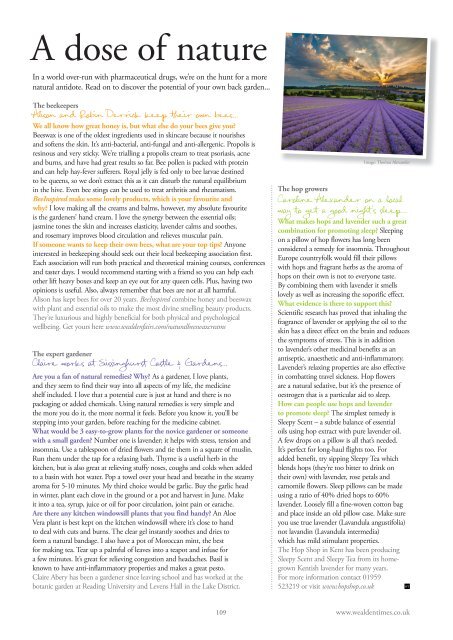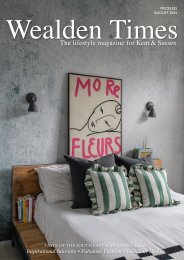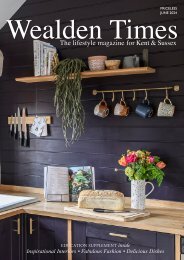Surrey Homes | SH18 | April 2016 | Garden supplement inside
The lifestyle magazine for Surrey - Inspiring Interiors, Fabulous Fashion, Delicious Dishes
The lifestyle magazine for Surrey - Inspiring Interiors, Fabulous Fashion, Delicious Dishes
Create successful ePaper yourself
Turn your PDF publications into a flip-book with our unique Google optimized e-Paper software.
A dose of nature<br />
In a world over-run with pharmaceutical drugs, we’re on the hunt for a more<br />
natural antidote. Read on to discover the potential of your own back garden...<br />
The beekeepers<br />
Alison and Robin Derrick keep their own bees...<br />
We all know how great honey is, but what else do your bees give you?<br />
Beeswax is one of the oldest ingredients used in skincare because it nourishes<br />
and softens the skin. It’s anti-bacterial, anti-fungal and anti-allergenic. Propolis is<br />
resinous and very sticky. We’re trialling a propolis cream to treat psoriasis, acne<br />
and burns, and have had great results so far. Bee pollen is packed with protein<br />
and can help hay-fever sufferers. Royal jelly is fed only to bee larvae destined<br />
to be queens, so we don’t extract this as it can disturb the natural equilibrium<br />
in the hive. Even bee stings can be used to treat arthritis and rheumatism.<br />
BeeInspired make some lovely products, which is your favourite and<br />
why? I love making all the creams and balms, however, my absolute favourite<br />
is the gardeners’ hand cream. I love the synergy between the essential oils;<br />
jasmine tones the skin and increases elasticity, lavender calms and soothes,<br />
and rosemary improves blood circulation and relieves muscular pain.<br />
If someone wants to keep their own bees, what are your top tips? Anyone<br />
interested in beekeeping should seek out their local beekeeping association first.<br />
Each association will run both practical and theoretical training courses, conferences<br />
and taster days. I would recommend starting with a friend so you can help each<br />
other lift heavy boxes and keep an eye out for any queen cells. Plus, having two<br />
opinions is useful. Also, always remember that bees are not at all harmful.<br />
Alison has kept bees for over 20 years. BeeInspired combine honey and beeswax<br />
with plant and essential oils to make the most divine smelling beauty products.<br />
They’re luxurious and highly beneficial for both physical and psychological<br />
wellbeing. Get yours here www.wealdenfairs.com/naturalbeeswaxcreams<br />
The expert gardener<br />
Claire works at Sissinghurst Castle & <strong>Garden</strong>s...<br />
Are you a fan of natural remedies? Why? As a gardener, I love plants,<br />
and they seem to find their way into all aspects of my life, the medicine<br />
shelf included. I love that a potential cure is just at hand and there is no<br />
packaging or added chemicals. Using natural remedies is very simple and<br />
the more you do it, the more normal it feels. Before you know it, you’ll be<br />
stepping into your garden, before reaching for the medicine cabinet.<br />
What would be 3 easy-to-grow plants for the novice gardener or someone<br />
with a small garden? Number one is lavender; it helps with stress, tension and<br />
insomnia. Use a tablespoon of dried flowers and tie them in a square of muslin.<br />
Run them under the tap for a relaxing bath. Thyme is a useful herb in the<br />
kitchen, but is also great at relieving stuffy noses, coughs and colds when added<br />
to a basin with hot water. Pop a towel over your head and breathe in the steamy<br />
aroma for 5-10 minutes. My third choice would be garlic. Buy the garlic head<br />
in winter, plant each clove in the ground or a pot and harvest in June. Make<br />
it into a tea, syrup, juice or oil for poor circulation, joint pain or earache.<br />
Are there any kitchen windowsill plants that you find handy? An Aloe<br />
Vera plant is best kept on the kitchen windowsill where it’s close to hand<br />
to deal with cuts and burns. The clear gel instantly soothes and dries to<br />
form a natural bandage. I also have a pot of Moroccan mint, the best<br />
for making tea. Tear up a palmful of leaves into a teapot and infuse for<br />
a few minutes. It’s great for relieving congestion and headaches. Basil is<br />
known to have anti-inflammatory properties and makes a great pesto.<br />
Claire Abery has been a gardener since leaving school and has worked at the<br />
botanic garden at Reading University and Levens Hall in the Lake District.<br />
Image: Thomas Alexander<br />
The hop growers<br />
Caroline Alexander on a local<br />
way to get a good night’s sleep...<br />
What makes hops and lavender such a great<br />
combination for promoting sleep? Sleeping<br />
on a pillow of hop flowers has long been<br />
considered a remedy for insomnia. Throughout<br />
Europe countryfolk would fill their pillows<br />
with hops and fragrant herbs as the aroma of<br />
hops on their own is not to everyone taste.<br />
By combining them with lavender it smells<br />
lovely as well as increasing the soporific effect.<br />
What evidence is there to support this?<br />
Scientific research has proved that inhaling the<br />
fragrance of lavender or applying the oil to the<br />
skin has a direct effect on the brain and reduces<br />
the symptoms of stress. This is in addition<br />
to lavender’s other medicinal benefits as an<br />
antiseptic, anaesthetic and anti-inflammatory.<br />
Lavender’s relaxing properties are also effective<br />
in combatting travel sickness. Hop flowers<br />
are a natural sedative, but it’s the presence of<br />
oestrogen that is a particular aid to sleep.<br />
How can people use hops and lavender<br />
to promote sleep? The simplest remedy is<br />
Sleepy Scent – a subtle balance of essential<br />
oils using hop extract with pure lavender oil.<br />
A few drops on a pillow is all that’s needed.<br />
It’s perfect for long-haul flights too. For<br />
added benefit, try sipping Sleepy Tea which<br />
blends hops (they’re too bitter to drink on<br />
their own) with lavender, rose petals and<br />
camomile flowers. Sleep pillows can be made<br />
using a ratio of 40% dried hops to 60%<br />
lavender. Loosely fill a fine-woven cotton bag<br />
and place <strong>inside</strong> an old pillow case. Make sure<br />
you use true lavender (Lavandula angustifolia)<br />
not lavandin (Lavandula intermedia)<br />
which has mild stimulant properties.<br />
The Hop Shop in Kent has been producing<br />
Sleepy Scent and Sleepy Tea from its homegrown<br />
Kentish lavender for many years.<br />
For more information contact 01959<br />
523219 or visit www.hopshop.co.uk<br />
109 www.wealdentimes.co.uk


















